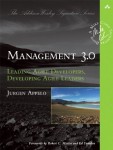Jason Little's book Lean Change Management is the first to be published by Happy Melly…

50 Books for Your Reading List
This is a list of the 50 books that were most useful for me while writing my third book.
The writing of Management 3.0 Workout is behind me. Now it is time to reflect. 🙂
Here you find a list of the 50 books that were most useful/important for me while writing my third book. When you download my FREE book you will notice that the Bibliography section actually has many more references to books and articles. However, I can safely say that these 50 books were most valuable to me.
Maybe you find them valuable too?
Note: I am an Amazon affiliate. By clicking on the links you help me pay for this blog. Thanks!
 Do you seek more advice about modern Management and Leadership?
Do you seek more advice about modern Management and Leadership?
Get the book!
Management 3.0
Leading Agile Developers, Developing Agile Leaders

GET MY FREE BOOK!
“How to Change the World”

GET MY FREE BOOK!
“How to Change the World”



















































